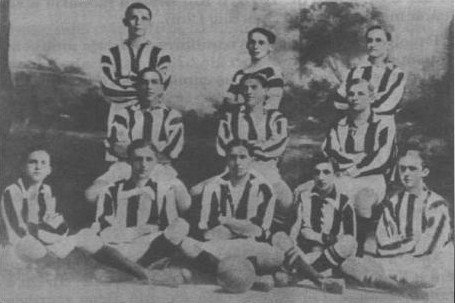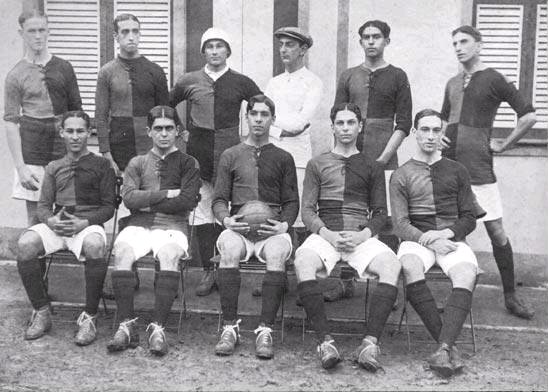|
Nogueirão
Estádio Leonardo Nogueira, usually known as Nogueirão, is a multi-use stadium located in Mossoró, Brazil. It is used mostly for football matches and hosts the home matches of the two most important teams of the city Associação Cultural Esporte Clube Baraúnas and Potiguar de Mossoró. The stadium has a maximum capacity of 25,000 people and was built in 1967. Nogueirão is owned by the Liga Desportiva Mossoroense (Mossoró City Sporting League). The stadium is named after Manoel Leonardo Nogueira, who was the president of the city's Liga Municipal de Esportes (Municipality's Sport League) and was responsible for the stadium's construction. History In 1967, the works on Nogueirão were completed. The inaugural match was played on June 4 of that year, when Ceará beat Mossoró City Combined Team 2–0. Ceará's Mozart scored the first goal of the stadium. The stadium's attendance record currently stands at 18,063, set on August 11, 1985 when Flamengo Clube de Regatas do ... [...More Info...] [...Related Items...] OR: [Wikipedia] [Google] [Baidu] |
Associação Cultural Esporte Clube Baraúnas
Associação Cultural Esporte Clube Baraúnas, or Baraúnas as they are usually called, is a Brazilian football team from Mossoró in Rio Grande do Norte, founded on January 14, 1960. History In 1924, Baraúnas was initially a carnival block (meaning ''bloco carnavalesco'' in Portuguese).''Enciclopédia do Futebol Brasileiro'', Volume 1 - Lance, Rio de Janeiro: Aretê Editorial S/A, 2001. Some of the members of this block, on January 14, 1960, founded Esporte Clube Baraúnas. In 1966, Esporte Clube Baraúnas changed its name to Associação Cultural Esporte Clube Baraúnas. In 1989, Baraúnas competed in the Campeonato Brasileiro Série B, being eliminated in the first stage. In 1998, the club competed in the Campeonato Brasileiro Série C, being eliminated in the first stage. In 2005, Baraúnas competed in the Copa do Brasil for the first time. In the first stage, the club beat América Mineiro, in the second stage, the club beat Vitória, in the third stage, Baraúnas ... [...More Info...] [...Related Items...] OR: [Wikipedia] [Google] [Baidu] |
Associação Cultural E Desportiva Potiguar
Associação Cultural e Desportiva Potiguar, commonly known as Potiguar or as Potiguar de Mossoró, are a Brazilian football team from Mossoró. They won the Campeonato Potiguar once and competed in the Série A twice. Potiguar is currently ranked fourth among Rio Grande do Norte teams in CBF's national club ranking at 157th place overall. They are the best placed team in the state from outside of Greater Natal. History They were founded on February 11, 1945, as Esporte Clube Potuguar by a group of sportsmen. They fused with Associação Desportiva Potiguar on June 19, 1953. The club won the Campeonato Potiguar in 2004. Potiguar competed in the Série A in 1979, when they were eliminated in the first stage. The club was eliminated in Copa João Havelange's first stage of the Green module in 2000. Stadium They play their home games at the Nogueirão Estádio Leonardo Nogueira, usually known as Nogueirão, is a multi-use stadium located in Mossoró, Brazil. It is used mos ... [...More Info...] [...Related Items...] OR: [Wikipedia] [Google] [Baidu] |
Stadium
A stadium ( : stadiums or stadia) is a place or venue for (mostly) outdoor sports, concerts, or other events and consists of a field or stage either partly or completely surrounded by a tiered structure designed to allow spectators to stand or sit and view the event. Pausanias noted that for about half a century the only event at the ancient Greek Olympic festival was the race that comprised one length of the stadion at Olympia, where the word "stadium" originated. Most of the stadiums with a capacity of at least 10,000 are used for association football. Other popular stadium sports include gridiron football, baseball, cricket, the various codes of rugby, field lacrosse, bandy, and bullfighting. Many large sports venues are also used for concerts. Etymology "Stadium" is the Latin form of the Greek word " stadion" (''στάδιον''), a measure of length equalling the length of 600 human feet. As feet are of variable length the exact length of a stadion depends on the ... [...More Info...] [...Related Items...] OR: [Wikipedia] [Google] [Baidu] |
Mossoró
Mossoró () is the second most populous city in the state of Rio Grande do Norte, Brazil, and also the largest municipality of that state. It is equidistant (four hours' drive) from Natal (approximately 277 km or 172 miles), the state capital of Rio Grande do Norte, and from Fortaleza (approximately 260 km or 161.5 miles), the capital of the state of Ceará. It is also in the heart of Brazil's salt production area. Situated in the Oeste Potiguar mesoregion, Mossoró is the country's largest land-based petroleum producer. History To Brazilians, the main historical distinctions of the city are the driving off an attack by Lampião and his gang of "social bandits" (see Cangaço) that plundered entire towns in the ''sertão'' during the 1920s and 1930s; and also the fact that the city freed its slaves five years before the Lei Áurea abolished slavery in the rest of the country in 1888. Mossoró was also the first city to give women the right to vote in Brazil (Professo ... [...More Info...] [...Related Items...] OR: [Wikipedia] [Google] [Baidu] |
Brazil
Brazil ( pt, Brasil; ), officially the Federative Republic of Brazil (Portuguese: ), is the largest country in both South America and Latin America. At and with over 217 million people, Brazil is the world's fifth-largest country by area and the seventh most populous. Its capital is Brasília, and its most populous city is São Paulo. The federation is composed of the union of the 26 States of Brazil, states and the Federal District (Brazil), Federal District. It is the largest country to have Portuguese language, Portuguese as an List of territorial entities where Portuguese is an official language, official language and the only one in the Americas; one of the most Multiculturalism, multicultural and ethnically diverse nations, due to over a century of mass Immigration to Brazil, immigration from around the world; and the most populous Catholic Church by country, Roman Catholic-majority country. Bounded by the Atlantic Ocean on the east, Brazil has a Coastline of Brazi ... [...More Info...] [...Related Items...] OR: [Wikipedia] [Google] [Baidu] |
Football (soccer)
Association football, more commonly known as football or soccer, is a team sport played between two teams of 11 players who primarily use their feet to propel the ball around a rectangular field called a pitch. The objective of the game is to score more goals than the opposition by moving the ball beyond the goal line into a rectangular framed goal defended by the opposing side. Traditionally, the game has been played over two 45 minute halves, for a total match time of 90 minutes. With an estimated 250 million players active in over 200 countries, it is considered the world's most popular sport. The game of association football is played in accordance with the Laws of the Game, a set of rules that has been in effect since 1863 with the International Football Association Board (IFAB) maintaining them since 1886. The game is played with a football that is in circumference. The two teams compete to get the ball into the other team's goal (between the posts and under t ... [...More Info...] [...Related Items...] OR: [Wikipedia] [Google] [Baidu] |
Ceará Sporting Club
Ceará Sporting Club, or Ceará, as they are usually called, is a Brazilian football team from the city of Fortaleza, capital city of the Brazilian state of Ceará, founded on June 2, 1914, by Luís Esteves and Pedro Freire. Ceará is one of the most traditionally successful clubs in the Northeast region of Brazil alongside Bahia, Santa Cruz, Sport, Náutico, Vitória and their city rivals Fortaleza. History On June 2, 1914, the club was founded as Rio Branco Football Club by Luiz Esteves Junior and Pedro Freire. Later, some of their friends also joined: Gilberto Gurgel, Walter Barroso, Raimundo Justa, Newton Rôla, Bolívar Purcell, Aluísio Mamede, Orlando Olsen, José Elias Romcy, Isaías Façanha de Andrade, Raimundo Padilha, Rolando Emílio, Meton Alencar Pinto, Gotardo Morais, Artur de Albuquerque, Cincinato Costa, Carlos Calmon and Eurico Medeiros. As Rio Branco Football Club, the team colors were white and lilac. In 1915, on their first birthday, the club changed i ... [...More Info...] [...Related Items...] OR: [Wikipedia] [Google] [Baidu] |
Clube De Regatas Do Flamengo
Clube de Regatas do Flamengo (; English: ''Flamengo Rowing Club''), more commonly referred to as simply Flamengo, is a Brazilian sports club based in Rio de Janeiro, in the neighborhood of Gávea, best known for their professional football team that plays in Campeonato Brasileiro Série A, as well as Campeonato Carioca. The club was first established in 1895 specifically as a rowing club and did not play their first official football match until 1912. Flamengo's traditional uniform features red and black striped shirts with white shorts, and red and black striped socks. Flamengo has typically played their home matches in the Maracanã, the national stadium of Brazil, since its completion in 1950, with some exceptions in recent years. Since 1969, the vulture (Portuguese: ''urubu'') has been the most recognized mascot of Flamengo. Flamengo established themselves as one of Brazil's most successful sports clubs in the 20th century during the era of state leagues in Brazil w ... [...More Info...] [...Related Items...] OR: [Wikipedia] [Google] [Baidu] |



